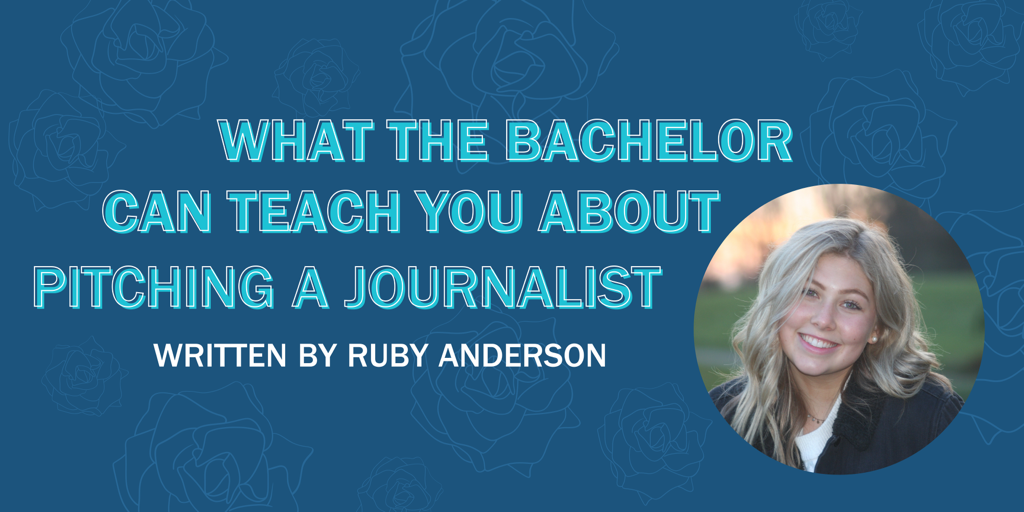What “The Bachelor” can Teach you About Pitching a Journalist

Psychotic women, love-struck men, drama, outrageous TV personalities, and endless gossip all come to mind when thinking about the reality television show “The Bachelor.” The series follows one man on his “journey for love” as he dates 30 women simultaneously in order to find “the one.” Although not what might initially come to mind, there are powerful lessons public relations students can learn from this dramatic series.
One of the most fundamental aspects of public relations is landing press coverage in the mainstream media. PR pros have been pitching stories to journalists since the beginning of time, but not everyone knows how to do it well. Creating good relationships with journalists is the first step to excelling in your career.
Landing press coverage with a journalist is a lot like the dramatic journey of landing the Bachelor. There are ups and downs, unexpected twists and turns, dramatic turns of events; luckily, many have attempted it before, and we can learn from their mistakes.
First Impressions Are Everything
It’s night one. The limos are full of women dressed to the nines, hoping to make the best first impression on this year’s bachelor. Everyone has come prepared with some sort of pickup line to set them apart since they know they will have little time to dazzle the man of the evening before another woman jumps in to steal him away.
Think of the journalist to whom you are pitching as the bachelor. You have one shot to impress them in your pitch before they are swept away by the hundreds of emails filling their inbox. The surest way to a journalist’s heart is to connect with them — research their hobbies, interests, and beats, then convey in your pitch that you’ve done your research.
Caitlin Kelly, a journalist for The New York Times, says, “Throwing random emails at me is deeply annoying, rude, and sucks up my time. They’re 99.9% useless: generic, evergreen, and have nothing to do with me or what I am working on.”
Surprisingly, Kelly gets very few emails that actually appeal to what she writes about or cares about outside of work: an easy fix that fans of the Bachelor know is crucial.
A Little Drama is Sometimes Necessary
It’s week two. The “villain” of the season was just sent home and ratings are down. Someone has to take one for the team and spice it up a little with some (unnecessary) drama. Although it feels completely out of left field, “The Bachelor” franchise’s goal is to retain viewers, through whatever means necessary.
In order to capture and retain the attention of the journalist you’re pitching, there has to be some drama involved. Unlike “The Bachelor,” you should not throw around false accusations. Instead, hooking the reader’s attention is crucial.
Kelly shares that one of her biggest pet peeves when receiving PR pitches is that they are “Boring. No news or not enough to make this appealing to any editor I know, not enough detail, no color… just bland PR talk.”
A good hook can be anything from a compliment on a previous story to an interesting fact about the news you’re sharing. Either way, sell your story without going too far (no one likes a drama queen).
Honesty Is Crucial
It’s week four. The contestants are sitting around chatting in the house when one woman lets it slip that she has a boy waiting for her back home if things don’t work out. We all know that gossip spreads like wildfire on a reality show, and soon enough, the bachelor is escorting the woman out for breaking his trust.
Be honest with the journalist you’re pitching. The surest way to get blocked is through sending a clickbait email without any substance or a good story. Don’t fake numbers, promise visuals you don’t have, or embellish the story – otherwise you will be escorted out of the inbox as fast as Sarah from season 26.
Emails with subject lines containing hashtags, percentages, or too many exclamation points tend to be an immediate red flag in journalists’ emails.
The Timing Has to be Right
The season is over, and the bachelor didn’t end up with either of the two women left. After some time away from the spotlight, he ends up dating a girl who got sent home after night one. Their public statement says something to the effect of “I didn’t realize what I was doing when I sent ____ home. But now the timing is right and we’re happier than ever.”
Timing is also crucial when pitching journalists.
1. Send emails in the morning. You want to be at the top of their inbox in the morning, not competing with others throughout the day.
2. It’s ok if a story doesn’t work out the first time. Maybe the journalist is covering too many stories at the moment, but the door is open for the future.
A 2021 Muck Rack survey concluded that a majority of journalists like to receive pitches in the mornings, between 5-9 a.m., well before their deadlines. Each media outlet has its own deadlines depending on their publishing schedule, so morning pitches ensure plenty of time to research and write a story.
Upon careful watching of hit reality show “The Bachelor,” there are many important lessons to be had from watching women navigate relationships on national television. Pitching a journalist is about making the right impression, honestly selling your story, and patiently nurturing relationships.
In order to become a successful public relations professional, you must master the art of a pitch. Still, these skills must be practiced before they are perfected, and we all know the bachelor gets 30 tries.

Ruby Anderson is a junior studying public relations at Brigham Young University with minors in business and vocal performance. Passionate about music and the arts, she is also the program director for Adaptive Show Choir, a performance club where student volunteers teach musical theater songs and dances to individuals with disabilities.
